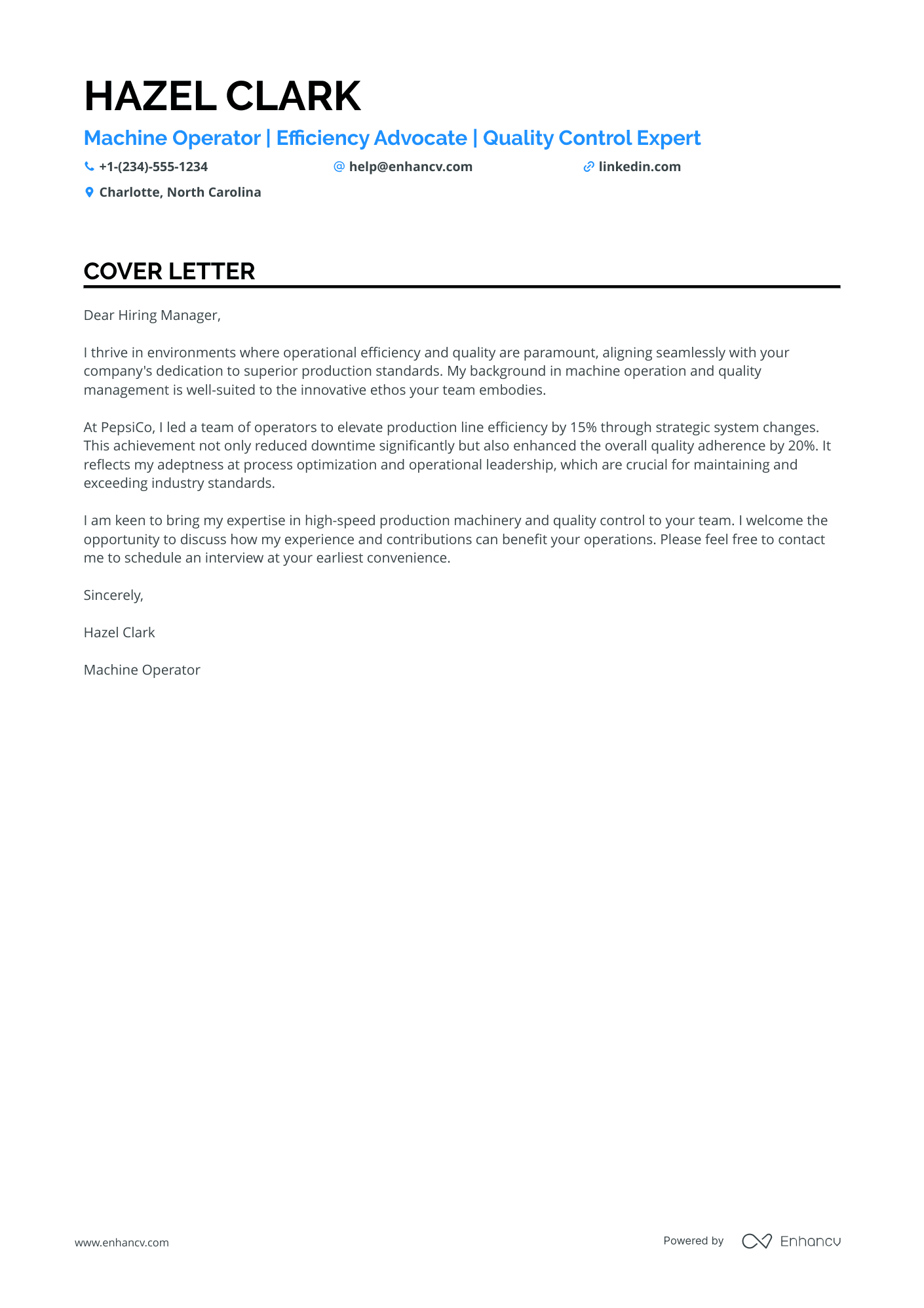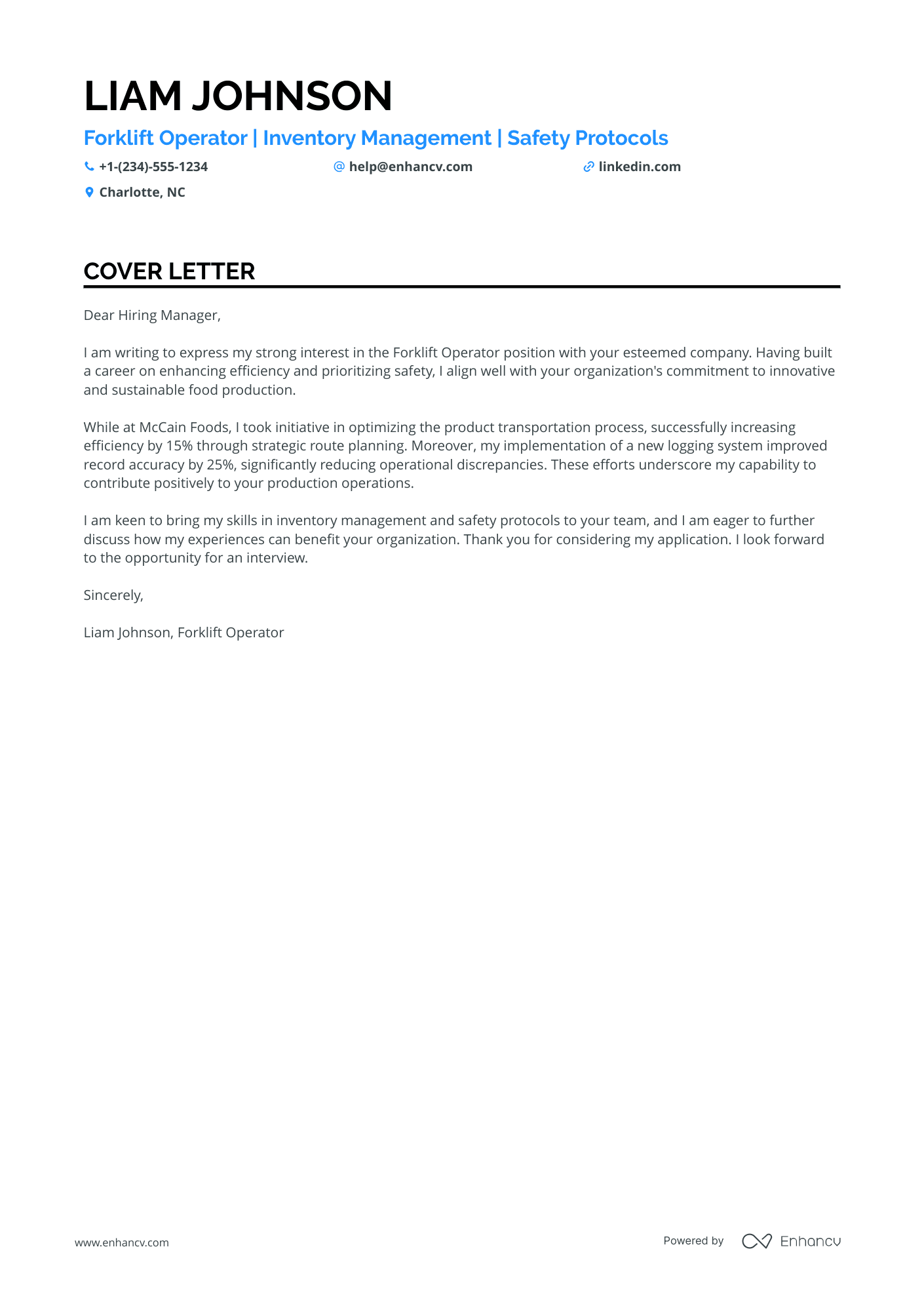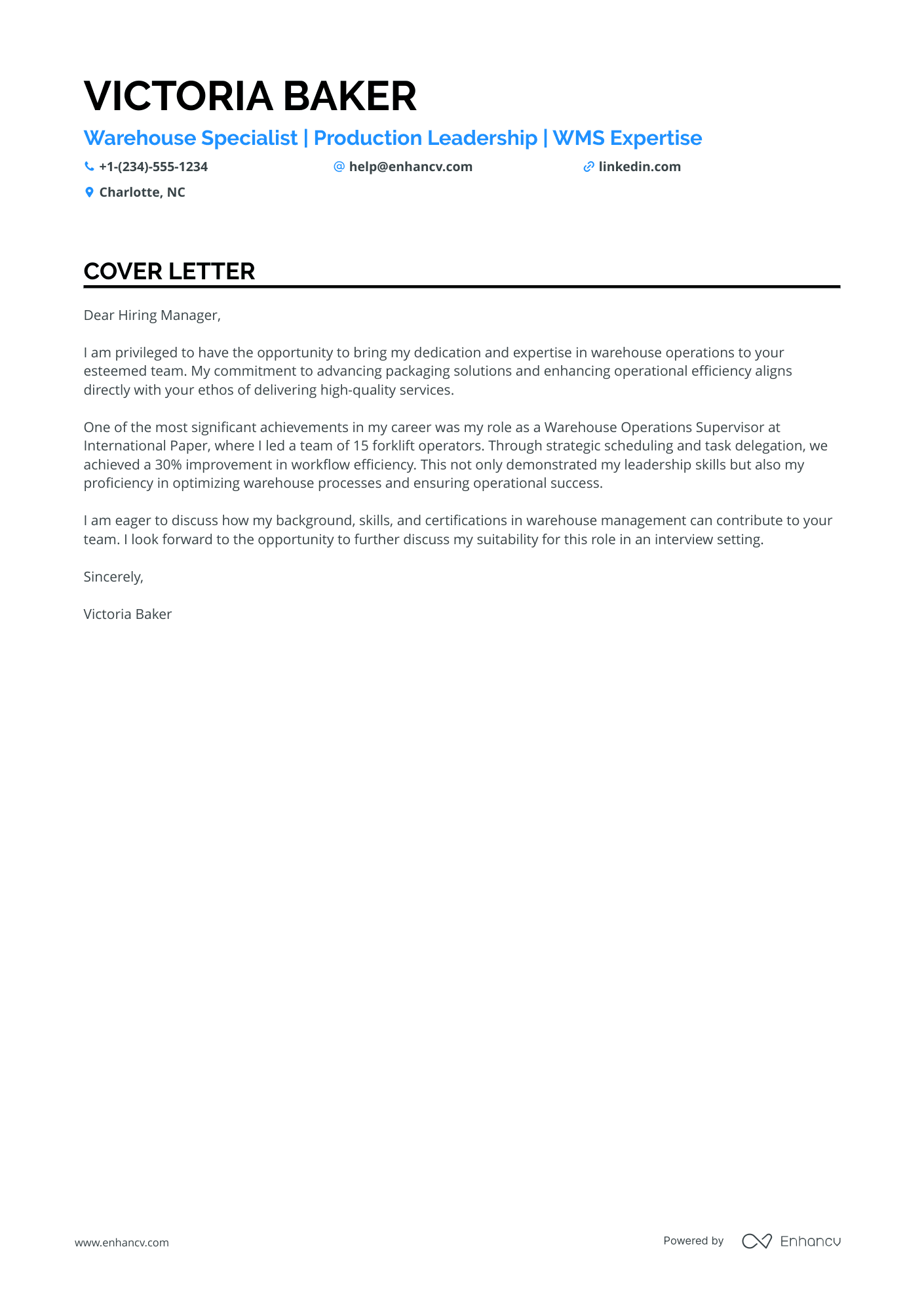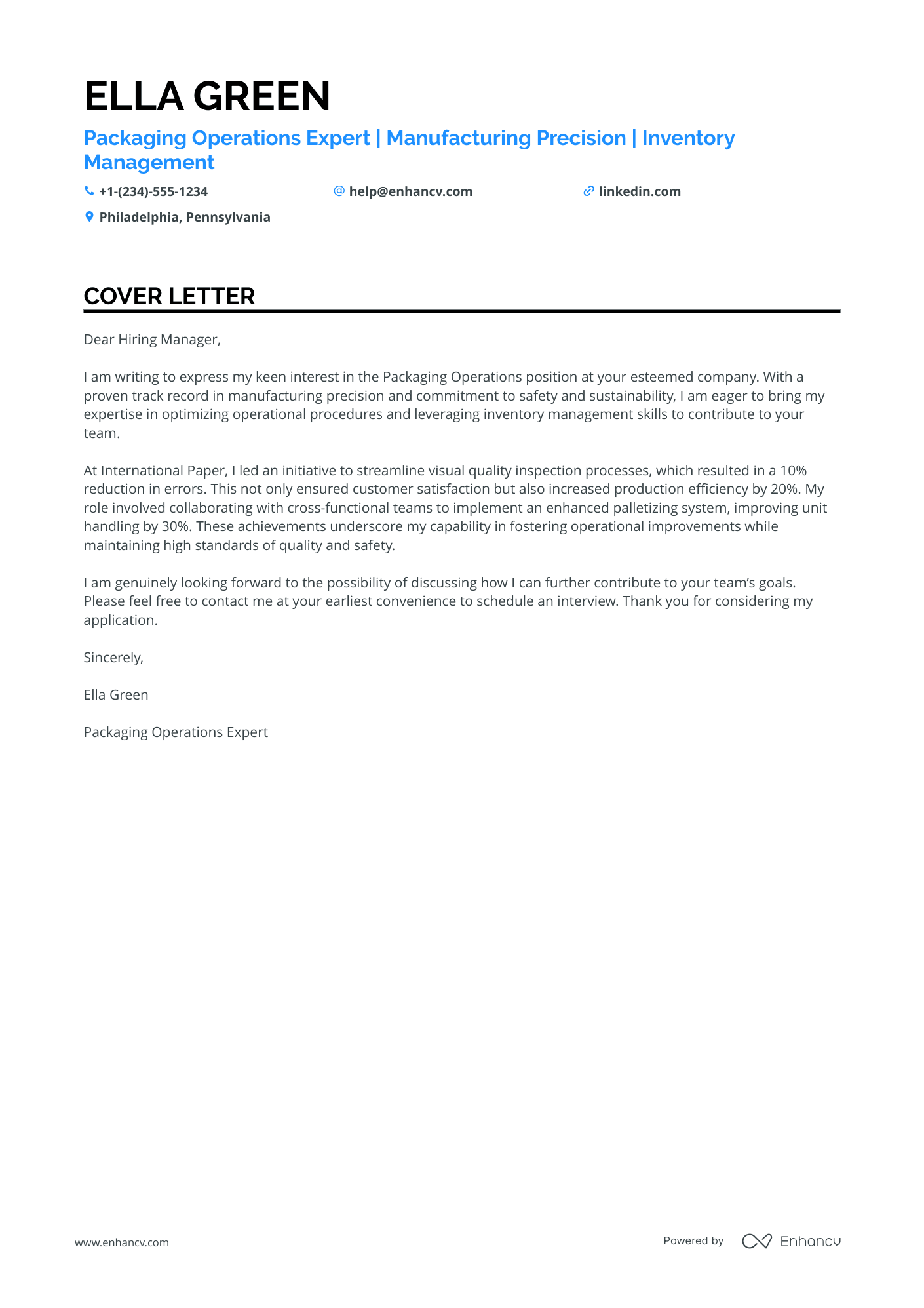Navigating the job market as a forklift operator can often lead you to the crucial step of crafting a cover letter that stands out. You might feel stuck, realizing your cover letter should highlight a significant achievement without echoing your resume. It's about telling your unique story in a formal yet original tone, avoiding worn-out phrases that hiring managers have seen countless times. In this article, learn the art of drafting a concise, one-page cover letter that captures your professional pride and sets you apart.
- Personalize the greeting to address the recruiter and your introduction that fits the role;
- Follow good examples for individual roles and industries from job-winning cover letters;
- Decide on your most noteworthy achievement to stand out;
- Format, download, and submit your forklift operator cover letter, following the best HR practices.
Use the power of Enhancv's AI: drag and drop your forklift operator resume, which will swiftly be converted into your job-winning cover letter.
If the forklift operator isn't exactly the one you're looking for we have a plethora of cover letter examples for jobs like this one:
- Forklift Operator resume guide and example
- Farm Manager cover letter example
- Distributor cover letter example
- Warehouse Manager cover letter example
- Contractor cover letter example
- Assembly Technician cover letter example
- Automotive Technician cover letter example
- Logistics Coordinator cover letter example
- Dispatcher cover letter example
Drop your resume here or choose a file.
PDF & DOCX only. Max 2MB file size.
Forklift operator cover letter example
ZOEY WALKER
Austin, Texas
+1-(234)-555-1234
help@enhancv.com
- Emphasizing past successes, such as leading a safety initiative resulting in a year without incidents, can demonstrate the candidate's achievements and dedication to safety in the field of heavy equipment operation.
- Highlighting specific experience relevant to the industry, like road grading and smoothing over a significant distance, showcases the candidate's hands-on experience and the tangible impact of their work on community infrastructure.
- Mentioning the willingness to undergo further discussions provides a proactive approach and shows the candidate's eagerness to contribute and adapt their skills to a new team and projects.
- Using quantitative results, such as "over 50 miles of road grading and smoothing," offers concrete evidence of the candidate's capabilities, making the cover letter more compelling and credible.
The visual appeal of your forklift operator cover letter: format, font, and structure
When using our cover letter builder, make sure to include these vital sections:
- Header (with your name, contact details, the role, and date);
- Greeting (that's personalized to the recruiter);
- Introductory paragraph (to capture attention);
- Body paragraph (to tell a story of how you've obtained your job-crucial skills);
- Closing paragraph (ending with a nod to the future ahead);
- Signature (that is not a must).
Our cover letter templates are already set up for you with the best forklift operator cover letter design with single-spaced paragraphs and a one-inch margin.
As for the font of your forklift operator cover letter, use the same one as you did in your resume (where modern and simple fonts, like Rubik and Bitter, take precedence over Arial and Times New Roman).
Your forklift operator cover letter is created with the recruiters in mind - as no Applicant Tracker System looks over this part of your profile.
When sending over your forklift operator cover letter, download it in PDF. This format allows your information and design to stay intact and to keep the same visual quality.
Too busy to write your cover letter? Let our free cover letter generator handle it in just a few clicks.
The top sections on a forklift operator cover letter
- Header: Includes the forklift operator’s contact information, which is vital for a recruiter to readily identify and reach the applicant for follow-up.
- Greeting: Addresses the hiring manager directly, demonstrating a professional approach and personal touch which is essential in making a good first impression.
- Introduction: Briefly summarizes the forklift operator’s experience and interest in the position, providing a compelling reason for the recruiter to continue reading.
- Body: Highlights specific forklift handling skills, safety qualifications, and relevant certifications, showcasing the applicant’s suitability for the logistics or warehouse operations in question.
- Closing: Reiterates the forklift operator's enthusiasm for the role, includes a call to action such as requesting an interview, and thanks the recruiter for considering the application, leaving a respectful and proactive final impression.
Key qualities recruiters search for in a candidate’s cover letter
- Safety-conscious mindset: Forklift operation is inherently risky, and employers prioritize candidates who demonstrate a strong commitment to safety protocols to prevent accidents and injuries.
- Certification and training: Recruiters look for candidates with proper forklift certification and training, as this indicates the individual is formally educated on operations, safety, and maintenance of forklifts.
- Experience in material handling: Prior work experience in material handling and operating various types of forklifts is highly valued, as it reduces training time and increases operational efficiency.
- Mechanical aptitude: Basic knowledge of mechanics and the ability to troubleshoot minor forklift issues can save time and resources, making such candidates more desirable.
- Attention to detail: The ability to accurately inventory goods, note discrepancies, and manage logistics details is critical for a forklift operator to ensure proper stock handling and warehouse organization.
- Physical fitness and stamina: The role often requires physical strength, dexterity, and the endurance to operate a forklift for extended periods, as well as sometimes performing manual warehouse tasks.
Personalizing your forklift operator cover letter salutation
Always aim to address the recruiter from the get-go of your forklift operator cover letter.
Use:
- the friendly tone (e.g. "Dear Paul" or "Dear Caroline") - if you've previously chatted up with them on social media and are on a first-name basis;
- the formal tone (e.g. "Dear Ms. Gibbs" or "Dear Ms. Swift") - if you haven't had any previous conversation with them and have discovered the name of the recruiter on LinkedIn or the company website;
- the polite tone (e.g. "Dear Hiring Manager" or "Dear HR Team") - at all costs aim to avoid the "To whom it may concern" or "Dear Sir/Madam", as both greetings are very old-school and vague.
List of salutations you can use
- Dear Hiring Manager,
- Dear [Company Name] Team,
- Dear [Department] Manager,
- Dear Mr./Ms. [Last Name],
- Dear [Job Title] Hiring Committee,
Using your forklift operator cover letter intro to show your dedication
We know just how difficult it is to start writing your forklift operator cover letter introduction.
There are so many great qualities you have as a professional, which one should you choose?
How about writing up to two sentences about your passion and commitment to the work you do or are set to do?
Try to describe exactly what you enjoy about the potential role.
A positive attitude from the get-go will help you stand out as a motivated forklift operator professional.
How to select your best achievement for the middle, or the forklift operator cover letter body
You probably feel exhausted by this point in your application: you've dived into all the details of your success and skills in your forklift operator resume.
What else can you include in your forklift operator cover letter body?
Well, for starters, the next three to six paragraphs should show you further value as a professional. Or, why should recruiters choose you?
Think back on a noteworthy achievement that answers key job requirements and dive deep.
Structure your forklift operator cover letter middle as you'd a story: following chronological logic and highlighting outcomes, thanks to skills.
At the end of the day, you'd want recruiters to be able to see you as the best candidate for the role and understand more about who you are and what makes your success unique (and valuable to the role).
Thinking about the closing paragraph of your forklift operator cover letter
Before your signature, you have extra space to close off your forklift operator cover letter.
Use it to either make a promise or look to the future.
Remind recruiters how invaluable of a candidate you are by showing what you plan to achieve in the role.
Also, note your availability for a potential next meeting (in person or over the telephone).
By showing recruiters that you're thinking about the future, you'd come off as both interested in the opportunity and responsible.
What to write on your forklift operator cover letter, when you have zero experience
The best advice for candidates, writing their forklift operator cover letters with no experience, is this - be honest.
If you have no past professional roles in your portfolio, focus recruiters' attention on your strengths - like your unique, transferrable skill set (gained as a result of your whole life), backed up by one key achievement.
Or, maybe you dream big and have huge motivation to join the company. Use your forklift operator cover letter to describe your career ambition - that one that keeps you up at night, dreaming about your future.
Finally, always ensure you've answered why employers should hire precisely you and how your skills would benefit their organization.
Key takeaways
Winning at your job application game starts with a clear and concise forklift operator cover letter that:
- Has single-spaced paragraphs, is wrapped in a one-inch margin, and uses the same font as the forklift operator resume;
- Is personalized to the recruiter (using their name in the greeting) and the role (focusing on your one key achievement that answers job requirements);
- Includes an introduction that helps you stand out and show what value you'd bring to the company;
- Substitutes your lack of experience with an outside-of-work success, that has taught you valuable skills;
- Ends with a call for follow-up or hints at how you'd improve the organization, team, or role.
Forklift Operator cover letter examples
By Experience
Senior Forklift Operator
- Highlight specific achievements and contributions, such as leading a team to improve production line efficiency by 15%, which demonstrates both leadership and technical skills relevant to a Machine Operator role.
- Mention post-related expertise like experience with high-speed production machinery and quality control, which are directly applicable to the responsibilities of the position.
- Align personal skills and experience with the company's values and operational needs, showcasing how past experiences fit the company's commitment to operational efficiency and quality.
- Express enthusiasm about contributing specific skills to the prospective employer’s team, making a direct connection between personal skills and the company's goals.
Junior Forklift Operator
- Highlighting Specific Achievements: Emphasizing quantifiable improvements, such as increasing efficiency by 15% or improving record accuracy by 25%, showcases the candidate's ability to make impactful contributions.
- Demonstrating Initiative and Innovation: Describing how the candidate optimized processes and implemented new systems indicates a proactive and innovative mindset, which is valuable for operational roles.
- Alignment with Company Values: Connecting personal career goals with the organization’s commitment to innovation and safety can demonstrate cultural fit and shared values, which are important for successful integration into the team.
Lead Forklift Operator
- Highlighting Leadership Experience: The letter emphasizes the candidate's experience as a Warehouse Operations Supervisor, showcasing their leadership and ability to manage a team effectively.
- Quantifying Achievements: The candidate uses a specific metric (30% improvement in workflow efficiency) to demonstrate their success in previous roles, making the achievement tangible and impactful.
- Aligning with Company Values: The letter mentions the candidate's alignment with the company's ethos of delivering high-quality services, showing that they understand the company's goals and culture.
- Expressing Eagerness: The candidate expresses enthusiasm about the opportunity to contribute to the team, which can be appealing to hiring managers looking for motivated candidates.
By Role
Certified Forklift Operator
- Emphasizing specific achievements: The cover letter highlights a successful initiative to streamline visual quality inspection processes, showing tangible results, such as reducing errors by 10% and increasing production efficiency by 20%.
- Detailing relevant experience: The author provides a clear example from their previous position at International Paper, demonstrating their direct experience in the packaging operations sector, which is crucial for the role.
- Showcasing teamwork and collaboration: The letter mentions collaborating with cross-functional teams to implement an enhanced palletizing system, highlighting the candidate's teamwork skills and ability to work effectively with others.
- Expressing enthusiasm and readiness for the role: The closing paragraph conveys the candidate’s eagerness to contribute to the team, inviting further discussion, and shows confidence in their capability to benefit the company.












